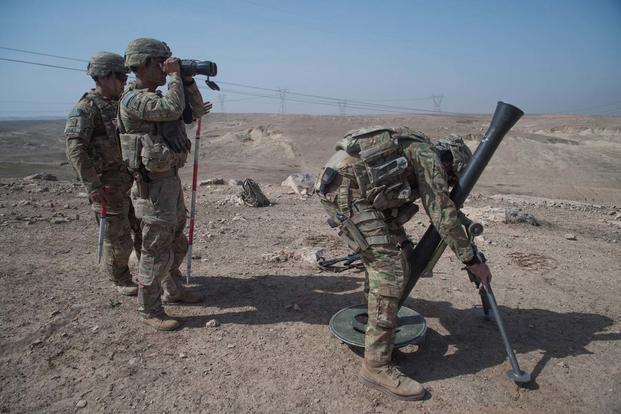Defense Secretary Jim Mattis and the White House reportedly are considering initial proposals from U.S. Central Command that would send 1,000 more troops into Syria to accelerate the fight against the Islamic State.
The proposals, first reported Wednesday by The Washington Post, would build on suggestions from Army Gen. Joseph Votel, the head of the command, who spoke last month during a visit to the region of the need for more artillery and logistics support for the coming assault by the U.S.-supported Syrian Democratic Forces on the Raqqa stronghold of the Islamic State of Iraq and Syria, or ISIS.
If approved by Mattis and President Donald Trump, the additional forces would likely come from a mix of troops from the Army's 82nd Airborne Division and the 24th Marine Expeditionary Unit, which was aboard ships headed for the Mediterranean.
Last week, the Defense Department announced that an additional 2,500 conventional troops, including troops of the 82nd Airborne Division's 2nd Brigade Combat Team based at Fort Bragg, North Carolina, were being sent to Kuwait where they would be on standby for possible deployment to either Iraq or Syria to support local forces against ISIS.
About 1,700 of the 2nd BCT troops from the 82nd are already in Kuwait and Iraq in the train, advise and assist role with the Iraqi Security Forces.
"The remainder of the brigade will be leaving Fort Bragg, going to Kuwait to be postured there to do all things Mosul, Raqqa -- all in between. So the whole brigade will now be forward," Lt. Gen. Joseph Anderson, the Army's deputy chief of staff, told the House Armed Services Committee Wednesday.
Mattis has made clear since his Senate confirmation hearings that he was looking for ways to accelerate the campaign against ISIS that could include scrapping the Obama administration's separate caps on the number of U.S. troops in Iraq and Syria.
Currently, about 500 mostly Special Forces troops are permitted in Syria and a little more than 5,000 in Iraq under what are called the Force Management Levels.
However, the number of U.S. troops in Syria began going above the caps earlier this month. A small contingent of Army Rangers and Stryker combat vehicles has moved into Manbij in northeastern Syria and an estimated force of about 400 Marines from the 11th Marine Expeditionary Unit has deployed into Syria to set up a firebase for M777 .155mm howitzers near the ISIS stronghold of Raqqa.
On Jan. 27, in his first trip to the Pentagon, Trump directed Mattis to draw up a plan within 30 days to speed up the ISIS campaign and Mattis delivered the closely-held plan on Feb. 27.
"It is a plan to rapidly defeat ISIS," said Navy Capt. Jeff Davis, a Pentagon spokesman, said at the time but he stressed that "this is a preliminary plan" whose details would not be disclosed to allow for continued discussion and to avoid giving the enemy forewarning.
The plan called for the involvement of "all elements of national power" in what Davis called a "trans-regional approach" to defeating ISIS. "Diplomacy is a key part of the plan" that was focused on ISIS but was also shaped to include other "trans-regional" terrorist groups, Davis said. "This is really a framework for broader discussion."
Earlier at the Brookings Institution, Joint Chiefs Chairman Gen. Joseph Dunford said the U.S. was looking to the possibility of a long-term presence of U.S. troops in Iraq following the ouster of ISIS from its last remaining stronghold in the northwestern Iraqi city of Mosul.
"We have, as has NATO, begun a dialogue about a long-term commitment to grow the capacity, maintain the capacity of Iraqi Security Forces, but no decisions have been made yet," Dunford said.
When asked about the Mattis plan, Dunford said "It's fair to say we'll provide him (Trump) a full range of options."
-- Richard Sisk can be reached at Richard.Sisk@Military.com.




























